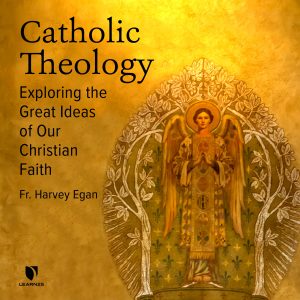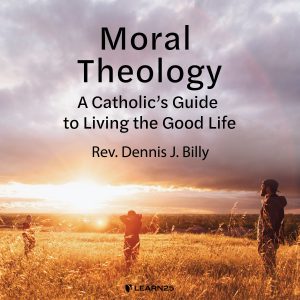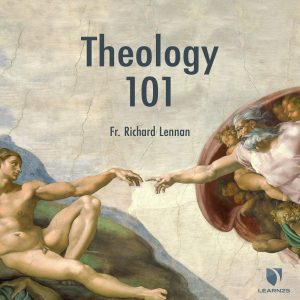Every week, we proclaim to believe in “one, holy, catholic, and apostolic church,” but what does this really mean?
At its heart, the Church is a product of God’s initiative: it is a dimension of our relationship with the God whom we come to know through Jesus Christ and the Holy Spirit. By exploring the theology of the Church and the faith that it evokes, you will encounter the challenge and possibility of living faith in the Church today.
Under the guidance of leading theologian Fr. Richard Lennan, you will explore the impact of Vatican II and how it shaped our understanding of the Church. Through exploring the ideas of such noted theologians as Yves Congar and Walter Kasper, lifelong Catholics will gain new insights into the theology of the Church.
As you look at the role of Jesus Christ and the Holy Spirit in the Church, you will understand that God’s presence in the Church embodies constant call, challenge, and guidance. The Church, then, is not simply an institution, but the very essence of our faith. I
Every week, we proclaim to believe in “one, holy, catholic, and apostolic church,” but what does this really mean?
At its heart, the Church is a product of God’s initiative: it is a dimension of our relationship with the God whom we come to know through Jesus Christ and the Holy Spirit. By exploring the theology of the Church and the faith that it evokes, you will encounter the challenge and possibility of living faith in the Church today.
Under the guidance of leading theologian Fr. Richard Lennan, you will explore the impact of Vatican II and how it shaped our understanding of the Church. Through exploring the ideas of such noted theologians as Yves Congar and Walter Kasper, lifelong Catholics will gain new insights into the theology of the Church.
As you look at the role of Jesus Christ and the Holy Spirit in the Church, you will understand that God’s presence in the Church embodies constant call, challenge, and guidance. The Church, then, is not simply an institution, but the very essence of our faith. In analysing the relationship between the Church and the wider world, you will explore the possibilities that God enables and His universal call for us to share in the life of the Church.
Explore how the Church unites us, as Catholics, today.
Learn about downloadable programs.
Your Free Electronic Study Guide! When you order this course, we will send you a free electronic study guide that you can access in 3 convenient ways:
1) You can check your order confirmation email. It will include a link that enables you to download your guide.
2) The back of your program package also contains a copy of this link. You can access your guide by simply entering this URL into your browser.
3) Your case of CDs or DVDs will contain a copy of your electronic guide on CD. Simply insert this disc into your computer’s CD/DVD drive to access your guide.
$19.99




You must be logged in to post a review.
© 2021 Learn 25 | Privacy Policy | Terms of Use | MP3 Downloads | Customer Support
Stay in the know.
Enter your email address for a free coupon, and to find out about future specials and promotions. You may unsubscribe at any time.


In an effort to provide our customers the best possible experience, we have created a new website for you at Learn25.com to browse our selection of over 400 audio and video courses by top professors.
Bob –
Did not like
The presenter spends too much time repeating himself and emphasizing broad concepts, but without conveying enough details. The course is tedious to listen to.
Andrea Lorenzo –
An honest discussion of the Church as BOTH “gift and project”
I just finished listening to Fr. Richard Lennan’s course on Understanding the Theology of Church (i.e., Ecclesiology). Okay. Let’s get this out of the way: It was excellent. I would rank it in the top five NYKM courses I have heard (and I have listened to well over thirty courses).
Why do I say this?
First, Fr. Lennan is a very good lecturer, energetic and strong in his presentation. He is organized and logical in the structure of his lectures. What is more: his lectures (which are good from the start), actually get more powerful as the course unfolds. The final three are truly dynamic in their delivery and, more importantly, their message.
Second, and perhaps most important, Fr. Lennan is HONEST. I must confess that when I began this lecture series, I was afraid that I would be subjected to a barrage of triumphalistic rhetoric that focuses on pure theory, emphasizing the glorious and divinely inspired character of the Church, while ignoring the stark realities we face today. I was pleasantly surprised that Fr. Lennan was fearless in his willingness to grapple with what the Church is called to be and the many ways that we fail to live up to this calling.
The climate of today’s American church can often reflect tremendous factionalism that, in the main, sadly parallels the gridlock that chokes our country’s political system. Catholic Conservatives are pitted against Catholic Liberals, both self-assured they have a corner on Truth. Rhetoric is extreme, shallow, and usually completely unproductive (not unlike Congress). Sadly, this situation of political factionalism within the Church is not new. Paul’s first letter to the Corinthians (dated ca. A.D. 55) speaks of the same conditions as crippling the early community (1 Cor. 1:10-12), destroying their practice of Eucharist (1 Cor. 11:20-22).
Fr. Lennan addresses this failure to respect each other and to offer each other a sympathetic hearing. Lennan urges an attitude of openness, noting memorably that the Church is not “a gated community (Lecture 4).” He would base this openness on a radical awareness of God’s love for everyone, stating “We first need to be aware that God loves all people unconditionally even those who differ from us, even those whose attitudes and approaches we would regard as wrong. So it’s not a matter of not challenging that but it is not resorting to simply seeing people as wrong (Lecture 5).” The answer for Lennan lies in a readiness to hear each other, noting: “Dialogue which is necessary for unity involves not simply speaking but also the willingness to listen. And to listen out of an expectation that I’ll discover the Spirit in a new way through others, ways that will be different from what I’ve come to know already. And that itself is a challenge. That sense that the Spirit can be at work in places and in people where I wouldn’t want or believe that the Spirit should be (Lecture 6).”
I loved Fr. Lennan’s treatment of the Church as Holy, one of the four “marks” of the Church listed in the Creed (Lecture 8). As I noted before, Lennan was refreshingly honest and forthright about “the failures that are associated with the sexual abuse crisis” as well as many other areas where the members of the Church have provided what he calls “a counter-testimony to Christ.” He references Pope St. John Paul II’s willingness to make public apologies for past failures of the Church, noting that “Our sin has impeded the Spirit’s working in the hearts of many people.” Far from leaving the listener with a sense of hopelessness, Lennan reminds us that the Church is BOTH “gift and project” and that “none of us is exempt from the need for conversion.”
There is MUCH more to like about Fr. Lennan’s work, however, I have run long enough. I will, therefore, end my review by sharing a quote from his final lecture (Lecture 12) that still haunts me with hope: “One of the major questions as we think about the future and think about the Spirit of Faith that might enable us to build that future is to imagine the Church of the future. What would we like the Church of the future to be? That’s not a denial of the Tradition but it’s rather trying to be creative about how the Tradition can be lived in a new way.”
I, for one, imagine a Church that values diversity, yet deeply meditates on its Tradition. I imagine a place where we leave the judging to God and place our emphasis on selfless service. I imagine a place that welcomes the wounded and provides a place for them to live and breathe. Just knowing that we have theologians like Fr. Lennan out there gives me hope that I may just see that Church yet.
Richard S., Australia –
2015 Spring Survey
It covers in great and clear detail the theology of the church.
John in DC –
Very informative!
I have to say that I found this program not only interesting and informative but, well organized.
The Professor takes the time to make sure that one understands the subtle but important definitions that one needs to understand the subject matter. In my opinion, he made what might otherwise be difficult to understand enjoyable to learn.
I could not have asked for a better value and I found myself listening to it longer than I had initially planned in each sitting.(in my car) I suppose that would be like when I have a hard time putting a good book down. Good Job!
Now I Know!
Dan –
Engaging speaker
Fr. Lennan is an engaging speaker with a gift for presenting complex theological concepts in an orderly manner, understandable to the non-theologian.